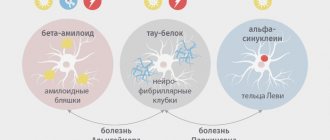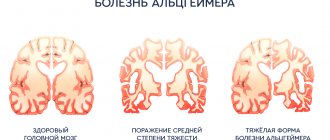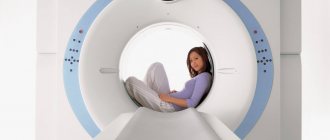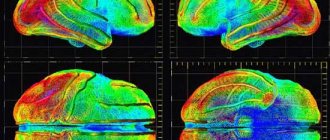The difference between dementia and Alzheimer's disease is absolutely incomprehensible to many, because in both cases we are always talking about memory impairment, changes in reaction speed and acuity of thinking, as well as changes in a person’s personality and behavior. Also, these pathologies are more typical for older people.
Most people don't know the difference between dementia and Alzheimer's. Moreover, many people think that these are the same disease. However, in fact, Alzheimer's pathology is only one of the causes of dementia.
Definition
Dementia is a syndrome that includes several individual symptoms leading to decline in brain activity, dementia and memory loss. From this definition it is clear that Alzheimer's disease and dementia are not the same thing. Dementia is characterized by:
- degradation of intellectual abilities;
- disorders of memory, thinking, perception and analysis of information;
- speech dysfunction;
- changes in emotional and mental state, loss of control over emotions;
- degradation of behavior in society with attacks of aggression;
- loss of motivation;
- violation of orientation in space and time;
- personality changes, etc.
Important! Dementia and Alzheimer's disease are different concepts!
The difference between Alzheimer's and dementia is that the former is a separate disease, and the latter is a manifestation characteristic of it. Dementia can also be simply referred to as dementia that is chronic and progresses over time. Its causes are changes in the brain as a result of exposure to various factors, leading to severe disturbances in its functioning. However, dementia with each pathology has its own distinctive features.
Differences between diseases
How to distinguish Alzheimer's disease from sclerosis? The main differences lie in the characteristics of the development and course of these diseases. In Alzheimer's disease, disorders appear gradually as cells die; in sclerosis, the patient may remain in a stable state for a long time, and changes in behavior usually occur suddenly due to another embolism. In the early stages of Alzheimer's disease, memory impairment, difficulty remembering current events and new information predominate, and in vascular dementia, learning requires more repetition. Senile sclerosis is often accompanied by mood swings, difficulty concentrating and social isolation.
Sclerosis and Alzheimer's disease can coexist. This is called mixed dementia.
Alzheimer's dementia
This syndrome most often affects people over 60 years of age, resulting in late-onset Alzheimer's dementia. However, in some cases, the disease can also affect relatively young people who have reached 40-45 years of age.
Pathogenesis and symptoms
In Alzheimer's pathology, a special protein accumulates in brain cells, forming plaques, and neurofibrillary tangles are formed from affected neurons. Both of these processes lead to disruption of neural connections, and Alzheimer's type dementia occurs.
The signs of this pathology are:
- progressive memory disorder;
- Over time, the patient ceases to perceive what is happening around him;
- loss of ability to navigate in time and space;
- progressive loss of skills and knowledge;
- in the later stages the patient does not recognize loved ones;
- loss of knowledge about the essence of objects and phenomena;
- speech impairment and its gradual loss (may remain in the form of muttering or moaning);
- loss of self-care skills;
- Over time, urination and defecation become spontaneous and uncontrollable;
- in the final stages, the patient falls into complete apathy and does not interact in any way with the outside world.
These symptoms of dementia of the Alzheimer's type make it possible to suspect pathology in the initial stages. If you notice signs of illness in yourself or your loved ones, you should immediately consult a doctor. Timely diagnosis will allow earlier initiation of therapy, which can slow down the progression of the disease itself and its unpleasant symptoms.
Dementia due to Alzheimer's disease may also be confirmed by the following criteria:
- gradual (often even imperceptible) onset;
- inevitable progression of symptoms;
- the patient does not have other pathologies that can lead to the development of dementia.
Unfortunately, today Alzheimer's syndrome is an incurable disease. Due to ignorance of the exact cause and mechanism of development of the disease, treatment of dementia of the Alzheimer's type is reduced only to maintenance therapy, which is unable to completely eliminate the pathology.
Stages
Alzheimer's disease, like many other long-term diseases, is characterized by a gradual development. Therefore, several stages of dementia can be distinguished in this pathology.
- Initial dementia of the Alzheimer's type. It manifests itself with almost imperceptible signs, the main of which will be memory impairment. The patient may forget the meaning of some words or some events. In addition, he has difficulties with analysis, forecasting and abstract thinking. At this stage, the patient himself is aware of the problems that arise, which is why emotional disorders develop. They can lead to insomnia, irritability, and cravings for alcoholic beverages.
- Early dementia due to Alzheimer's. Strong changes in the patient’s facial expressions, manifested by a constant expression of surprise on the face (rounding of the eyes, raising of the eyebrows, slightly open mouth). The patient forgets about the need for hygiene and begins to have difficulty oriented in space. There are difficulties with counting and writing, and slower motor activity.
- Middle stage of dementia. A person does not recognize loved ones, forgets almost all events from his own life. He is incapable of writing and reading, and his coordination of movements is clearly impaired. The patient becomes apathetic or shows aggression. Speech is impaired: the patient is unable to find words or is completely silent.
- Severe stage of Alzheimer's dementia. This last stage of the disease is characterized by the absolute destruction of a person’s personality. He does not recognize his reflection in the mirror, cannot remember who he is, and does not understand what is happening around him. The patient hardly moves, there is no speech. Tremors of the limbs and disorders in the form of delirium are often noted.
Progression of brain damage in Alzheimer's syndrome
| Stage | Changes in brain structures |
| Initial |
|
| Heavy |
|
With each stage, the disease progresses more and more, making the person absolutely helpless.
Alzheimer's disease
In Alzheimer's disease, two changes occur in the brain: amyloid deposits accumulate and neurofibrillary tangles appear. As the disease progresses, the patient begins to confuse words, his speech becomes slurred, and problems with self-care appear. Alzheimer's disease is not just about memory loss, it affects all aspects of life. An early sign of Alzheimer's disease does not necessarily have to be memory problems; for example, it may be difficulties with spatial orientation.
Comparison of Alzheimer's dementia with its other forms
The difference between Alzheimer's and other types of dementia is quite simple to detect. You just need to know what features are characteristic of other pathologies accompanied by the development of dementia.
Senile dementia
Senile dementia is considered as a general definition for all kinds of intellectual disorders associated with the degeneration of brain cells with aging. Senile dementia differs from Alzheimer's, because dementia in the syndrome is only one of the forms of age-related dementia, which includes disorders associated with Pick's disease, Parkinson's disease, vascular and other pathologies, as well as physiological dementia that develops during the aging process.
Senile dementia has many causes that can act individually or in combination:
- alcoholism and drug use;
- vascular pathologies;
- depression;
- poor nutrition;
- strokes and heart attacks;
- pathologies of the thyroid gland;
- other diseases of various body systems.
Important! Manifestations of dementia depend on the cause that caused it!
Senile Alzheimer's dementia is the most common type of age-related dementia (about 60-70%). “Normal” dementia in older people is characterized by the gradual death of brain neurons. Short-term memory is the first to be affected, then difficulties arise in communication and performing usual actions. The progression of senile dementia can take years, and it cannot be stopped.
For Pick's disease
Dementia and Pick's disease are also closely related. In people with this pathology, however, memory is not impaired at all. This is one of the characteristic differences from Alzheimer's dementia, where memory impairment is one of the first and main symptoms. Thanks to this feature, it is possible to distinguish between these two pathologies in the early stages.
Dementia due to Pick's disease is also characterized by episodes of short-term hallucinations that occur and end spontaneously. Relatives of patients often notice outbursts of sudden excitement. Such phenomena occur only in rare cases in patients with Alzheimer's.
Pick's disease is characterized by a change in the patient's personality in the earliest stages. The person becomes embittered and suspicious. This is also a diagnostic sign, because in Alzheimer's, personality disorders most often appear in the later stages of the disease.
Vascular dementia
Alzheimer's dementia and vascular dementia have only a few small differences.
Due to the similarity in the clinic, experts sometimes use the concept of vascular dementia of the Alzheimer's type. Differential diagnosis of asthma and diabetes
| Sign | Vascular dementia | Alzheimer's disease |
| Start | Sharp or gradual | Gradual |
| Development | Slow, stepwise, with fluctuations | Gradual with imperceptible progression |
| Neurological disorders | Focal symptoms present | No or minimal |
| Memory | Slightly damaged | Severely disrupted already in the initial stages |
| Executive functions | Suffer early and severely | Lost in later stages |
| Type of dementia | Subcortical | Cortical |
| Neuroimaging | Subcortical white matter lesions | Predominantly atrophy of the hippocampus and temporoparietal cortex |
| Walking | Often disrupted in the early stages | Usually doesn't change |
| Cerebrovascular history | Transient ischemic attacks, strokes, vascular pathologies | Vascular disorders are less common |
Pathology associated with vascular changes has some features:
- a sharp and strong (almost to a minimum) decrease in the ability to perceive and analyze information;
- The most common causes of pathology are: stroke, cerebral ischemia, peripheral vascular disease, cardiac dysfunction, high blood pressure, high cholesterol;
- there is no connection with old age and heredity, which makes it possible to distinguish dementia from Alzheimer's disease;
- rapid development if the cause of dementia is a stroke or other acute pathologies of the cerebral vessels;
- the presence of symptoms such as epileptic seizures and bladder dysfunction;
- Sometimes there are periods of short-term restoration of functions.
All these signs make it possible to differentiate dementia due to vascular disorders from Alzheimer's pathology.
Dementia in Parkinson's
Dementia due to Parkinson's disease is the second most common pathology after dementia due to Alzheimer's and Huntington's disease. It develops as a result of the death of nerve cells in the areas of the brain responsible for memory, psyche, the ability to learn and perceive information. The patient's consciousness remains clear despite all these changes.
Dementia and Parkinson's progress very slowly in most cases. First, mental abnormalities arise in the form of apathy and depression, followed by impaired attention, slurred speech, and only then memory disorders. Motor symptoms of dementia in Parkinson's are also noted:
- due to the weakening of facial muscles, the face looks like a mask;
- stiffness and muscle tension;
- pronounced stoop, shuffling and unsteady gait;
- retardation of movements;
- sudden and severe deterioration in handwriting.
Parkinsonism includes tremors of the limbs and jaws, as well as other similar disorders. Such movement disorders are not characteristic of Alzheimer's syndrome. Parkinsonism and dementia, indicating damage to the nervous system, almost with one hundred percent probability indicate a diagnosis of Parkinson's disease.
Dementia with Lewy bodies
This type of dementia is characterized by impaired motor functions, coordination, as well as spasmodic memory disorders, when the patient today does not remember his relatives, and tomorrow he can name them by name. And in patients with Alzheimer's, memory loss occurs gradually, until it is completely absent in the final stages.
In pathology with Lewy bodies, dementia differs from Alzheimer's disease by the appearance of hallucinations, increased muscle tone and sleep disturbances already in the early stages. Also, a differential criterion is that Alzheimer's syndrome is more often detected in women, and lesions with Lewy bodies are more often detected in men.
Factors that increase the risk of disease
Factors that increase the risk of developing the disease include:
- Patient’s age – as a rule, the disease appears in older people after 65 years of age;
- Moderate cognitive impairment (deterioration of memory, thought processes);
- Genetics and heredity;
- Traumatic brain injuries;
- Presence of cardiovascular diseases;
- Partially - the level of education of a person.
At the moment, dementia in Alzheimer's disease is an incurable disorder - correct therapy can only mitigate the symptoms of the disease and increase the patient's life expectancy. The AlkoSpas clinic uses the most effective and safest methods for treating brain disorders in older people.










